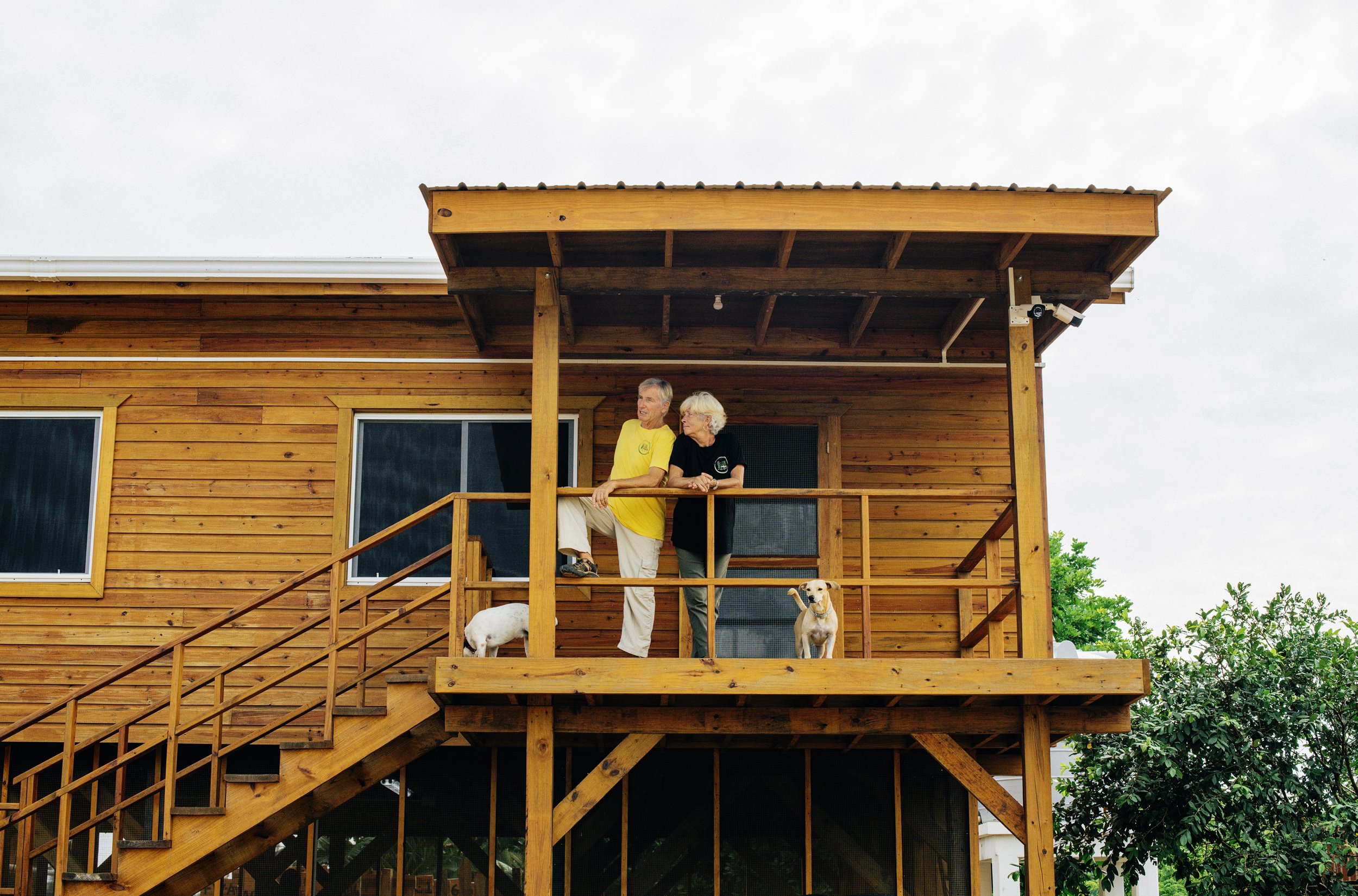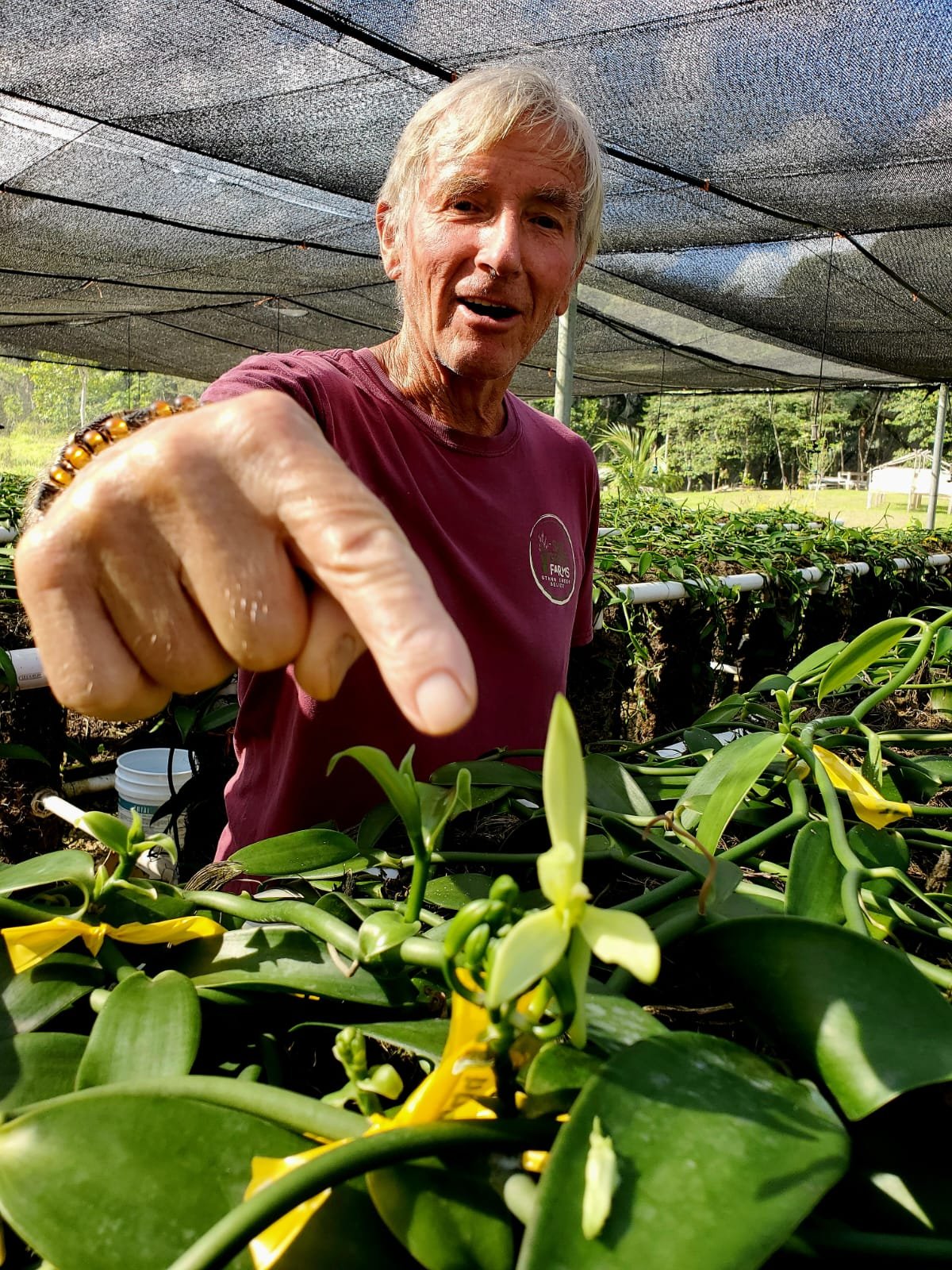
A Legacy of Conservation +
Socially Responsible Business
Q&A with Silk Grass Farms Co-founders Mandy Cabot and Peter Kjellerup
After nearly three decades leading the world renowned Dansko footwear company — a social enterprise the couple founded in 1990 — Mandy Cabot and Peter Kjellerup began spending time in Belize. They fell in love with the country’s stunning landscapes, vibrant culture, and welcoming people.
Mandy and Peter's passion for the country grew along with their desire to preserve and protect Belize’s abundant natural resources. One day, in 2018, an acquaintance called with an opportunity “they had to see to believe.” Belizean farmer and statesman Henry Canton took Peter and Mandy to visit a neglected farm located just west of the village of Silk Grass. Decades before, 3,000 acres of the sprawling property had been cleared for citrus and cattle, and later planted with coconuts. After 40 years of conventional agriculture, the land was eroded, the soil depleted, the citrus groves dead, and all but the coconut groves had been largely abandoned. But the property also included 24,500 acres of pristine rainforest — an expansive, biodiverse wildlife corridor critical to the regional ecosystem. They were struck then by a powerful vision for how they could give back to the land they had fallen in love with. They saw a path toward building their legacy — a meaningful punctuation to a lifetime of work dedicated to creating a new way of doing business.
Today, in partnership with Henry Canton, Mandy and Peter are the co-founders of Silk Grass Farms, a thriving agribusiness dedicated to demonstrating the intersection and connectedness of business and conservation.
In this Q&A, Peter and Mandy share why they started the farm and what its business practices and future mean to them.
Mandy (center) with members of the Silk Grass Farms team.
Why did you choose to co-found Silk Grass Farms? What about the farm and its agricultural and business models is most exciting and important to you?
Peter: I am from Denmark, and every Dane is raised from early childhood with a healthy respect for the natural world, and a feeling of protectiveness for what little land we have. We care about how we manage the country’s natural resources. I was also a farmer in a former life, so the work of rehabilitating a rundown and overgrown farm didn’t scare me.
Mandy: Unlike Peter, I didn’t know anything about farming before owning Silk Grass Farms, but I did grow up in a family of conservationists. My grandfather co-founded the Maine Coast Heritage Trust and preserved 44,000 acres in southern Colorado. My dad served for decades on the boards of Conservation International, Woods Hole Oceanographic Institute, and The Island Institute in Maine. I grew up in a family where the unspoken creed was, “What will your legacy be?” Silk Grass Farms was a once-in-a-lifetime opportunity to protect one of the most beautiful, bountiful wildlife corridors we’d ever seen. We also wanted our legacy to have something to do with business. This would be our grand finale as businesspeople and Peter’s grand finale as a former farmer. This would be the mother of all impact investments.
Peter: From the beginning, we decided that three conditions would have to be met: One, the property would need a reliable, long-term source of income. It couldn’t rely on handouts from the government, private individuals, or foundations for its long-term support and maintenance. Two, we would need to institutionalize our values around business for the next generation of leaders — thinking beyond our own lifetimes. And finally, Mandy and I would relinquish control and, eventually, ownership of these entities. The last thing we want is for ownership of this land ever to leave the country.
You are the founders and former owners of the footwear company Dansko — a founding B Corporation. How are you institutionalizing your business values at Silk Grass Farms?
Mandy: Dansko shoe company started in our garage, and expanded over the years to operate out of two LEED-certified campuses. It was one of the first companies to earn B Corporation certification, and was 100% employee-owned by the time we “retired” in 2018.
Let me go back to my dad and his forebears. Yes, they were conservationists, but they were also old-school Capitalists. They lived in a time when business leaders had only one objective: to maximize ROI for stockholders at whatever cost, even if this had unintended consequences like environmental damage or human rights exploitation. This was simply how businesses were run.
Peter: We never bought into that. It never made sense to us that we should spend our adult lives making as much money as we possibly could, only to give it away to worthy causes when we died. We wanted to use business itself to help solve social and environmental problems, create good-paying jobs, and create positive social and environmental benefits.
Mandy: And we wanted to lock those values into the legal structure of our company so that this way of running a business — as a triple bottom-line company, valuing People, Planet and Prosperity equally — would continue into the future. That is where the B Corp certification comes in. Unlike traditional businesses, B Corps are accountable to ALL stakeholders — employees, customers, supply chain partners, and neighbors — not just shareholders. This commitment is written into their corporate governance documents. Attaining B Corp certification both institutionalizes values and provides a roadmap for successive generations of leadership.
Today, we are proud to say that Silk Grass Farms is Belize’s first certified B Corp — the first of many, we hope, that will one day be here with us.
Tyeshia Casimiro, Sergio Morales, and Alex Martinez (Founding Farm Manager) with Peter.
As expatriates and relative newcomers to Belize, what is your reaction to the history of colonialism there?
Mandy: We fell in love with Belize the minute we set foot here. But we were frankly horrified by the decades of extraction economics that had been going on. We wanted to help reverse that somehow. So this is our opportunity to act as stewards and help put back into Belize what belongs to Belize — using its natural resources to build community, economic strength, education, and leadership.
Peter: So we borrowed an idea from the American actor Paul Newman, along the lines of what he did with the Newman’s Own food brand and the Newman Family Foundation. We set up a nonprofit that will ultimately own everything: the land (in the form of a nature preserve), as well as the for-profit business that would be its economic engine. The nonprofit is set up here in Belize with a crystal-clear mandate and a management team populated by Belizeans. By Belize, for Belize.
What will the success of Silk Grass Farms do for the future of Belizeans?
Peter: Dozens of food crops flourish in this rich natural environment. We are committed to growing a diversity of products and gaining regenerative organic certification to ensure our financial and environmental sustainability. To ensure that Belize and our local communities benefit fully from this enterprise, we built a 130,000-square-foot, state-of-the-art food processing facility that can process and package nearly every conceivable product from our farms and other regional producers. This means we won't be exporting low-margin commodities to create profits for others overseas. Instead, we expect to create high-value products and high-value jobs right here in Belize.
Mandy: Profits from our agribusiness are designated exclusively to benefit the natural environment of Belize. Profits will flow to the Silk Grass Wildlife Preserve, which will be applied to protect wildlife habitat, clean air, and clean water. Silk Grass Farms will create food from nature and use the profits to protect the natural abundance on which we all depend — for generations to come. The Silk Grass vision is to invest our money in an enterprise that can benefit future generations; like I said, the mother of all impact investments.
Peter in the vanilla greenhouse.
What has been the most fun part of the Silk Grass Farms project so far? Most challenging? What project are you most excited about developing in the next year or two?
Peter: For me, the most fun part is seeing the return of wildlife — jaguars, of course, but also howler monkeys, tapirs, jaguarundi, coatimundi, scarlet macaws, toucans, jabiru storks, even crocodiles. The most challenging part is unlearning what I learned as a farmer many decades ago in Denmark, and learning the best practices of regenerative agriculture. And the most exciting part is learning the process of transforming bio waste — like coconut husks, wood chips, and orange peels — into biochar and wood vinegar to use as soil amendments on the farm.
Mandy: There are so many “fun parts,” it’s hard to pick a favorite. Seeing what we’ve been able to accomplish in such a short period of time is pretty amazing: seeing how quickly our rehabilitation efforts and new plantings are taking off, literally seeing how fast grass can grow! But also, building and working with such a talented, dedicated team of co-workers. As for what part is challenging, I would say keeping track of the many balls in the air, and getting my head around the latest technologies in food processing, waste management, and soil rehabilitation. What I’m most excited about is completing our Silk Grass Wildlife Preserve Management Plan and welcoming our first group of scientists to evaluate the water quality of our waterways and the biodiversity of our rainforest canopy.




